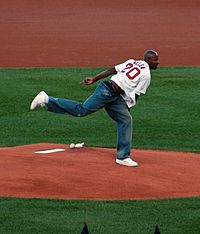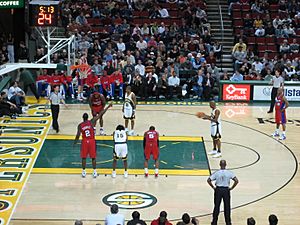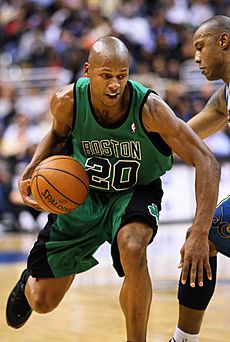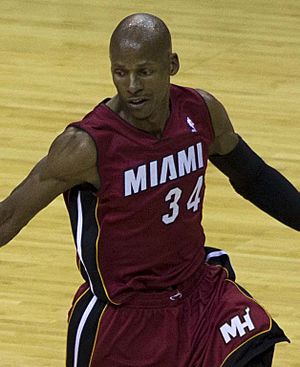Ray Allen facts for kids

Allen in 2016
|
||||||||||||||||||||||||||
| Personal information | ||||||||||||||||||||||||||
|---|---|---|---|---|---|---|---|---|---|---|---|---|---|---|---|---|---|---|---|---|---|---|---|---|---|---|
| Born | July 20, 1975 Merced, California, U.S. |
|||||||||||||||||||||||||
| High school | Hillcrest (Dalzell, South Carolina) | |||||||||||||||||||||||||
| Listed height | 6 ft 5 in (1.96 m) | |||||||||||||||||||||||||
| Listed weight | 205 lb (93 kg) | |||||||||||||||||||||||||
| Career information | ||||||||||||||||||||||||||
| College | UConn (1993–1996) | |||||||||||||||||||||||||
| NBA Draft | 1996 / Round: 1 / Pick: 5th overall | |||||||||||||||||||||||||
| Selected by the Minnesota Timberwolves | ||||||||||||||||||||||||||
| Pro career | 1996–2014 | |||||||||||||||||||||||||
| Career history | ||||||||||||||||||||||||||
| 1996–2003 | Milwaukee Bucks | |||||||||||||||||||||||||
| 2003–2007 | Seattle SuperSonics | |||||||||||||||||||||||||
| 2007–2012 | Boston Celtics | |||||||||||||||||||||||||
| 2012–2014 | Miami Heat | |||||||||||||||||||||||||
| Career highlights and awards | ||||||||||||||||||||||||||
|
||||||||||||||||||||||||||
| Career NBA statistics | ||||||||||||||||||||||||||
| Points | 24,505 (18.9 ppg) | |||||||||||||||||||||||||
| Rebounds | 5,272 (4.1 rpg) | |||||||||||||||||||||||||
| Assists | 4,361 (3.4 apg) | |||||||||||||||||||||||||
|
Medals
|
||||||||||||||||||||||||||
Walter Ray Allen Jr. (born July 20, 1975) is a famous American former professional basketball player. He played for 18 seasons in the National Basketball Association (NBA). In 2018, he was honored by being inducted into the Naismith Memorial Basketball Hall of Fame.
Ray Allen is known as one of the best three-point shooters in basketball history. He was an NBA All-Star ten times. He also won an Olympic gold medal with the U.S. men's basketball team in 2000. When he retired, he held the record for the most three-pointers made in NBA history. Stephen Curry later broke this record in 2021. As of 2025, Allen is still third on the NBA's all-time three-pointers list. In 2021, he was chosen for the NBA 75th Anniversary Team, which celebrates the league's greatest players.
Allen played college basketball for the Connecticut Huskies for three years. He was then picked fifth overall in the 1996 NBA draft. He became a top scorer for the Milwaukee Bucks. Later, he was traded to the Seattle SuperSonics, where he continued to set records for three-point and free throw shooting. Allen then joined the Boston Celtics, forming a powerful "Big Three" with Kevin Garnett and Paul Pierce. They won an NBA championship in 2008. After five seasons with the Celtics, he played for the Miami Heat for two years. He reached the NBA Finals both times and won another championship in 2013. His amazing three-pointer in Game 6 of the 2013 Finals, which forced overtime, is one of the most famous plays in NBA history. Ray Allen officially retired on November 1, 2016.
During his NBA career, Allen also acted in some movies. He played a basketball star named Jesus Shuttlesworth in Spike Lee's movie He Got Game (1998). Critics praised his acting, and "Jesus Shuttlesworth" became his nickname.
Contents
Early Life and High School Basketball
Ray Allen was born on July 20, 1975, in Merced, California. He was the third of five children. His father was in the military, so Ray moved around a lot as a child. He lived in England, Oklahoma, California, and Germany.
Eventually, his family settled in Dalzell, South Carolina, for four years. There, he went to high school. When he first arrived, other kids sometimes picked on him because of his British accent. But Ray was naturally athletic and worked very hard. When he had a growth spurt, he decided to focus on basketball. He wanted to become the best player he could be.
Ray practiced basketball every day, making sure it didn't get in the way of his schoolwork. By age fifteen, he was playing for Hillcrest High School's main team. He led them to their first state championship. In that championship game, he scored 25 points and grabbed 12 rebounds. Many colleges wanted him to play for them, and he chose the University of Connecticut.
College Career at UConn
Ray Allen played for the University of Connecticut from 1993 to 1996.
In his first year (1993–94), he played in 34 games and averaged 12.6 points. He was named to the Big East All-Freshman Team.
As a sophomore (1994–95), he started most games and averaged 21.1 points. He was chosen for the first-team All-Big East.
In his junior year (1995–96), he started all 35 games and averaged 23.4 points. He was named the Big East Player of the Year and again made the first-team All-Big East. The Huskies won their third straight Big East regular season title.
After his junior year, Allen decided to enter the 1996 NBA draft. In 2001, he was named an honorary captain for UConn's All-Century Basketball Team. In 2007, he was one of the first players honored in UConn's "Huskies of Honor" program. In March 2019, UConn retired his number 34 jersey. In May 2023, Ray Allen earned his Bachelor's Degree from UConn.
NBA Career Highlights
Milwaukee Bucks (1996–2003)
Ray Allen was picked fifth in the 1996 NBA draft by the Minnesota Timberwolves. But right away, he was traded to the Milwaukee Bucks. He signed a contract with the Bucks in July 1996.
Allen played his first NBA game on November 1, 1996. He scored 13 points in a win against the Philadelphia 76ers. In February 1997, he competed in the Slam Dunk Contest during the All-Star Weekend. He finished fourth. He had a strong first year and was named to the NBA All-Rookie Second Team.
In the 1997–98 season, Allen played and started all 82 games. He scored a career-high 35 points against the New York Knicks in December 1997.
In 1999, Allen signed a big contract extension with the Bucks. He made his first playoff appearance that season. In the 1999–2000 season, Allen played in his first NBA All-Star Game. He led the Bucks in scoring during the regular season and playoffs.
On February 7, 2001, Allen achieved his first "triple-double" (scoring double digits in three different stats) with 20 points, 10 rebounds, and 11 assists. A few days later, he won the 3-point shootout during All-Star Weekend. Allen, along with Sam Cassell and Glenn Robinson, helped the Bucks reach the Eastern Conference finals. He scored a playoff career-high 41 points in one game.
Seattle SuperSonics (2003–2007)
In the middle of the 2002–03 season, Ray Allen was traded to the Seattle SuperSonics. After dealing with injuries in the 2003–04 season, Allen was named to the All-NBA Second Team in the 2004–05 season. He led the Sonics to the playoffs that year.
In July 2005, Allen signed a new five-year contract with the SuperSonics. On March 12, 2006, he reached 15,000 career points. On April 7, 2006, he moved into second place on the NBA's all-time list for three-pointers made. On April 19, 2006, Allen broke the NBA record for most three-pointers made in a single season. Stephen Curry later broke this record.
In the 2006–07 season, Allen averaged a career-high 26.4 points per game. On January 12, 2007, he scored a career-high 54 points against the Utah Jazz. This was the second-highest score in Sonics history.
Boston Celtics (2007–2012)
On June 28, 2007, the Sonics traded Allen to the Boston Celtics. Soon after, the Celtics also got Kevin Garnett. With Allen, Garnett, and Paul Pierce, they formed a "Big Three." Allen changed his jersey number to 20 in Boston because Paul Pierce already wore number 34.
On February 13, 2008, Allen was chosen as an All-Star. Many thought he should have won the All-Star MVP award for his amazing scoring in the fourth quarter.
The Celtics finished the 2007–08 season with the best record in the league. They made it to the 2008 NBA Finals. On June 12, 2008, Allen played a key role in the biggest comeback in NBA Finals history. The Celtics came back from being down 24 points to win.
On June 17, 2008, in the final game of the 2008 NBA Finals, Allen tied an NBA Finals record by making seven three-pointers. The Celtics won the game and the championship, giving Allen his first NBA title.
Allen was named an All-Star again in 2009. On February 22, 2009, he broke the Celtics' record for most consecutive free throws made. In the 2009 playoffs, Allen scored 51 points in one game against the Chicago Bulls. The Celtics won that series but lost in the next round.
On December 10, 2009, Allen reached 20,000 career points. In Game 2 of the 2010 NBA Finals against the Los Angeles Lakers, Allen set a record for most three-pointers made in an NBA Finals game, hitting 8 of 11 shots. He became the first player in NBA history to have two games with at least seven three-pointers in the Finals. The Celtics lost that series in seven games.
After becoming a free agent, Allen re-signed with the Celtics in July 2010. On February 10, 2011, Allen became the NBA's all-time leader in total three-pointers made, passing Reggie Miller. He was named to his tenth All-Star game in the 2010–11 NBA season.
During the 2011–12 NBA season, Allen had some frustrations with trade rumors and an ankle injury. The Celtics lost to the Miami Heat in the Eastern Conference finals.
Miami Heat (2012–2014)
In the summer of 2012, Ray Allen decided to join the Miami Heat. He signed a two-year contract. In his first season with the Heat, he averaged 10.9 points per game. On April 25, 2013, Allen made his 322nd career three-pointer in the playoffs, breaking Reggie Miller's record for most playoff three-pointers. He also returned to wearing his favorite number 34 jersey.
In Game 6 of the 2013 NBA Finals against the San Antonio Spurs, the Heat were losing by three points. Allen made a game-tying three-pointer with only 5.2 seconds left, sending the game into overtime. The Heat won in overtime and forced a Game 7. In Game 7, the Heat won again, securing their second consecutive championship and Allen's second NBA title.
Allen stayed with the Heat for the 2013–14 NBA season. He played in 73 games and helped the Heat reach the NBA Finals for the fourth straight year. They faced the Spurs again but lost the series.
Retirement
After the 2014 season, Allen became a free agent. He decided to sit out the 2014–15 NBA season. In July 2016, he thought about coming back to play, but he officially retired on November 1, 2016.
In September 2018, Ray Allen was inducted into the Naismith Memorial Basketball Hall of Fame. In February 2019, he played in the NBA All-Star Celebrity Game. In October 2021, he was honored as one of the league's greatest players by being named to the NBA 75th Anniversary Team.
Acting Career
In 1998, Ray Allen starred with Denzel Washington in the Spike Lee movie He Got Game. He played a high school basketball star named Jesus Shuttlesworth. Critics praised his acting, and the name "Jesus Shuttlesworth" became his nickname among teammates and fans. Allen also appeared in the 2001 film Harvard Man. In 2015, he was in an episode of "Uncle Drew," a series of commercials.
Personal Life
Ray Allen married singer and actress Shannon Walker Williams on August 16, 2008. They have four children together.
Allen has said he has a mild case of obsessive–compulsive disorder. He believes this helps him with his very precise shooting style.
Ray Allen has been a spokesperson for youth basketball programs. He also started the "Ray of Hope" Foundation to help charities in different communities.
Former President Obama appointed Allen to the United States Holocaust Memorial Council. Allen supports the Holocaust Memorial Museum and has visited it many times. In 2017, he wrote an article about his visit to Auschwitz.
In November 2017, Allen stated in court that he was a victim of "catfishing" (being tricked by someone pretending to be someone else online).
His autobiography, From the Outside, was released on March 27, 2018.
On July 18, 2021, Allen was in a serious bicycle crash. He said his bicycle helmet saved his life.
In August 2021, Allen became the director of boys' and girls' basketball and the head coach for the boys' varsity team at Gulliver Preparatory School.
Career Statistics
College
| Year | Team | GP | GS | MPG | FG% | 3P% | FT% | RPG | APG | SPG | BPG | PPG |
|---|---|---|---|---|---|---|---|---|---|---|---|---|
| 1993–94 | Connecticut | 34 | 0 | 21.6 | .510 | .402 | .792 | 4.6 | 1.4 | 1.1 | .2 | 12.6 |
| 1994–95 | Connecticut | 32 | 31 | 32.8 | .489 | .445 | .727 | 6.8 | 2.3 | 1.9 | .5 | 21.1 |
| 1995–96 | Connecticut | 35 | 35 | 34.7 | .472 | .466 | .810 | 6.5 | 3.3 | 1.7 | .5 | 23.4 |
| Career | 101 | 66 | 29.7 | .487 | .448 | .779 | 6.0 | 2.4 | 1.6 | .4 | 19.0 | |
NBA
Regular season
| Year | Team | GP | GS | MPG | FG% | 3P% | FT% | RPG | APG | SPG | BPG | PPG |
|---|---|---|---|---|---|---|---|---|---|---|---|---|
| 1996–97 | Milwaukee | 82 | 81 | 30.9 | .430 | .393 | .823 | 4.0 | 2.6 | .9 | .1 | 13.4 |
| 1997–98 | Milwaukee | 82* | 82* | 40.1 | .428 | .364 | .875 | 4.9 | 4.3 | 1.4 | .1 | 19.5 |
| 1998–99 | Milwaukee | 50* | 50* | 34.4 | .450 | .356 | .903 | 4.2 | 3.6 | 1.1 | .1 | 17.1 |
| 1999–00 | Milwaukee | 82 | 82* | 37.4 | .455 | .423 | .887 | 4.4 | 3.8 | 1.3 | .2 | 22.1 |
| 2000–01 | Milwaukee | 82 | 82* | 38.2 | .480 | .433 | .888 | 5.2 | 4.6 | 1.5 | .2 | 22.0 |
| 2001–02 | Milwaukee | 69 | 67 | 36.6 | .462 | .434 | .873 | 4.5 | 3.9 | 1.3 | .3 | 21.8 |
| 2002–03 | Milwaukee | 47 | 46 | 35.8 | .437 | .395 | .913 | 4.6 | 3.5 | 1.2 | .2 | 21.3 |
| 2002–03 | Seattle | 29 | 29 | 41.3 | .441 | .351 | .920 | 5.6 | 5.9 | 1.6 | .1 | 24.5 |
| 2003–04 | Seattle | 56 | 56 | 38.4 | .440 | .392 | .904 | 5.1 | 4.8 | 1.3 | .2 | 23.0 |
| 2004–05 | Seattle | 78 | 78 | 39.3 | .428 | .376 | .883 | 4.4 | 3.7 | 1.1 | .1 | 23.9 |
| 2005–06 | Seattle | 78 | 78 | 38.7 | .454 | .412 | .903 | 4.3 | 3.7 | 1.3 | .2 | 25.1 |
| 2006–07 | Seattle | 55 | 55 | 40.3 | .438 | .372 | .903 | 4.5 | 4.1 | 1.5 | .2 | 26.4 |
| 2007–08† | Boston | 73 | 73 | 35.9 | .445 | .398 | .907 | 3.7 | 3.1 | .9 | .2 | 17.4 |
| 2008–09 | Boston | 79 | 79 | 36.4 | .480 | .409 | .952 | 3.5 | 2.8 | .9 | .2 | 18.2 |
| 2009–10 | Boston | 80 | 80 | 35.2 | .477 | .363 | .913 | 3.2 | 2.6 | .8 | .3 | 16.3 |
| 2010–11 | Boston | 80 | 80 | 36.1 | .491 | .444 | .881 | 3.4 | 2.7 | 1.0 | .2 | 16.5 |
| 2011–12 | Boston | 46 | 42 | 34.0 | .458 | .453 | .915 | 3.1 | 2.4 | 1.1 | .2 | 14.2 |
| 2012–13† | Miami | 79 | 0 | 25.8 | .449 | .419 | .886 | 2.7 | 1.7 | .8 | .2 | 10.9 |
| 2013–14 | Miami | 73 | 9 | 26.5 | .442 | .375 | .905 | 2.8 | 2.0 | .7 | .1 | 9.6 |
| Career | 1,300 | 1,149 | 35.6 | .452 | .400 | .894 | 4.1 | 3.4 | 1.1 | .2 | 18.9 | |
| All-Star | 10 | 0 | 20.1 | .423 | .310 | .765 | 2.6 | 2.2 | 1.1 | .2 | 14.5 | |
Playoffs
| Year | Team | GP | GS | MPG | FG% | 3P% | FT% | RPG | APG | SPG | BPG | PPG |
|---|---|---|---|---|---|---|---|---|---|---|---|---|
| 1999 | Milwaukee | 3 | 3 | 40.0 | .532 | .474 | .615 | 7.3 | 4.3 | 1.0 | .3 | 22.3 |
| 2000 | Milwaukee | 5 | 5 | 37.2 | .444 | .385 | .909 | 6.6 | 2.6 | 1.6 | .0 | 22.0 |
| 2001 | Milwaukee | 18 | 18 | 42.7 | .477 | .479 | .919 | 4.1 | 6.0 | 1.3 | .6 | 25.1 |
| 2005 | Seattle | 11 | 11 | 39.6 | .474 | .378 | .889 | 4.3 | 3.9 | 1.3 | .4 | 26.5 |
| 2008† | Boston | 26 |
26 |
38.0 | .428 | .396 | .913 | 3.8 | 2.7 | .9 | .3 | 15.6 |
| 2009 | Boston | 14 | 14 | 40.4 | .403 | .350 | .948 | 3.9 | 2.6 | 1.1 | .4 | 18.3 |
| 2010 | Boston | 24 | 24 | 38.5 | .431 | .386 | .863 | 3.3 | 2.6 | .9 | .1 | 16.1 |
| 2011 | Boston | 9 | 9 | 40.1 | .523 | .571 | .960 | 3.8 | 2.4 | 1.2 | .1 | 18.9 |
| 2012 | Boston | 18 | 10 | 34.2 | .395 | .304 | .711 | 4.1 | 1.0 | .9 | .1 | 10.7 |
| 2013† | Miami | 23 | 0 | 24.9 | .430 | .406 | .870 | 2.8 | 1.3 | .5 | .1 | 10.2 |
| 2014 | Miami | 20 | 1 | 26.4 | .413 | .388 | .919 | 3.4 | 1.6 | .7 | .2 | 9.3 |
| Career | 171 | 121 | 35.5 | .443 | .401 | .883 | 3.8 | 2.6 | 1.0 | .2 | 16.1 | |
Awards and Honors

- 2× NBA champion: 2008, 2013
- 3× Gold medalist with the USA men's basketball team: 1995 Summer Universiade, 2000 Summer Olympics & 2003 FIBA Americas Championship
- 10× NBA All-Star: 2000–2002, 2004–2009, 2011
- All-NBA Second Team: 2005
- All-NBA Third Team: 2001
- NBA All-Rookie Second Team: 1997
- NBA Joe Dumars NBA Sportsmanship Award: 2003
- The Sporting News "Good Guy": 2000, 2001, 2005
- NBA All-Star Weekend Three-point Shootout champion: 2001
- USA Basketball Male Athlete of the Year (1995)
Records
NBA Regular Season Records
- Most 3-point field goal attempts in a career: 7,429
NBA Playoffs Records
- Most 3-point field goals attempted in a game: 18 (Boston Celtics at Chicago Bulls, April 30, 2009, in 3 overtimes)
- This record is shared with Stephen Curry, Damian Lillard, Klay Thompson, and Russell Westbrook.
NBA Finals Records
- Most 3-point field goals made in a half: 7 (first half, Boston Celtics at Los Angeles Lakers, June 6, 2010)
- Most 3-point field goals made in a quarter: 5 (second quarter, Boston Celtics at Los Angeles Lakers, June 6, 2010)
- This record is shared with Stephen Curry.
Milwaukee Bucks Team Records
- Most consecutive games played: 400 (from November 1, 1996, to December 20, 2001)
- Most 3-point field goals made in a career: 1,051
- Most 3-point field goals made in a season: 229 (in the 2001 season)
- Most 3-point field goals made in a game: 10 (vs. Charlotte Hornets, April 14, 2002)
Seattle SuperSonics Team Records
- Most 3-point field goals made in a season: 269 (in the 2005 season)
- Most 3-point field goal attempts in a season: 653 (in the 2005 season)
Boston Celtics Team Records
- Highest free throw percentage in a season: .952 (237/249) (in the 2008 season)
- Most consecutive free throws made: 72 (from December 25, 2008, to February 23, 2009)
- Highest 3-point field goal percentage in a season: .453 (106/234) (in the 2011–12 season)
See also
 In Spanish: Ray Allen para niños
In Spanish: Ray Allen para niños
- List of NBA career scoring leaders
- List of NBA career 3-point scoring leaders
- List of NBA career free throw percentage leaders
 | DeHart Hubbard |
 | Wilma Rudolph |
 | Jesse Owens |
 | Jackie Joyner-Kersee |
 | Major Taylor |




